Far Cry 5 Review
The Far Cry franchise has long established itself as a sandbox experience, taking players to lush and mysterious locations, where they must overcome hardships, meet wildly crazy characters, and fight their way out. Publisher Ubisoft has got the franchise down to a largely enjoyable and successful formula that even allows for spinoffs such as Far Cry Primal. With Far Cry 5, things are a little different but also quite familiar. As is tradition across the publisher’s major franchises, this newest entry takes some inspiration from other games, namely last year’s Ghost Recon Wildlands, and molds it to fit into the safeguards of a Far Cry world. The end result is still an enjoyable, but largely disjointed game that puts all its eggs into the multiplayer mayhem basket, and feels like a slight step back for the series.
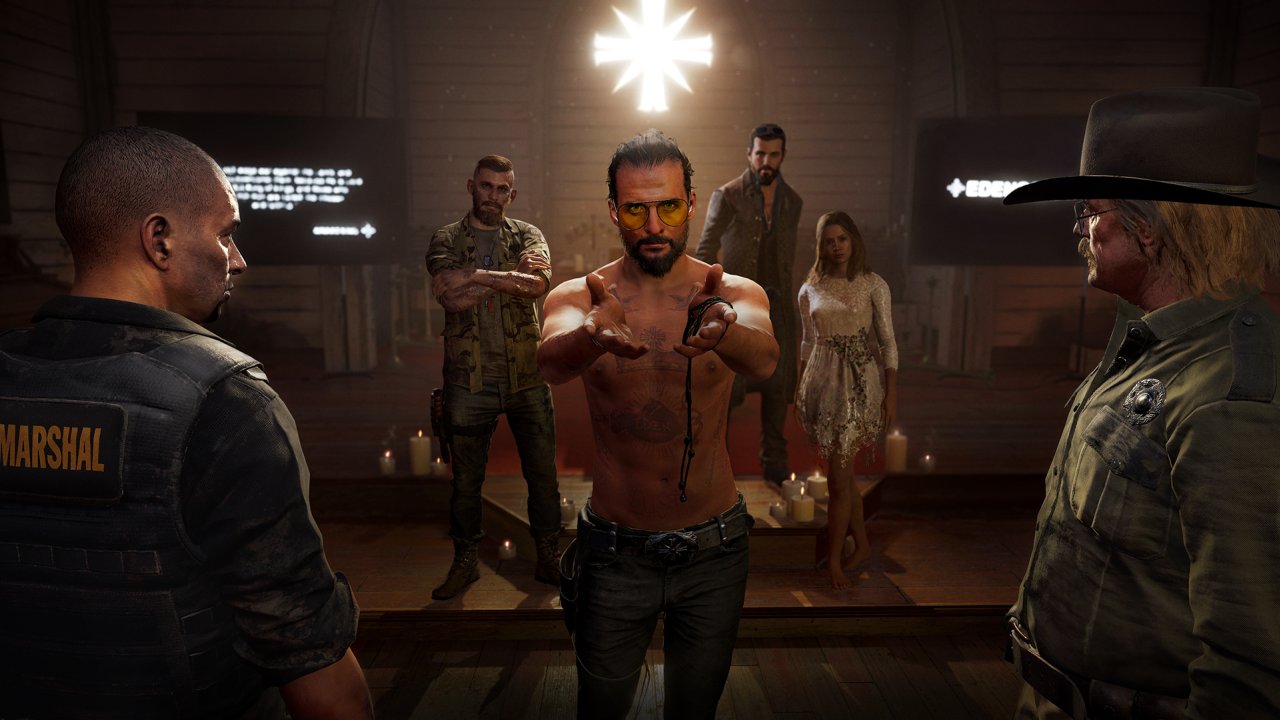
Players assume the role of a sheriff’s deputy in the fictional setting of Hope County, Montana, USA. For the first time in Far Cry, you’re able to customize your character with some basic facial choices, gender, and clothing. You, along with other members of local law enforcement, travel via helicopter to assist a US Marshal with executing an arrest warrant for Joseph Seed, also known as The Father, at his compound. This preacher is the leader of Eden’s Gate, a militaristic doomsday cult that has formed in the county. The Marshal executes the arrest warrant without casualties, however The Father’s fanatical followers throw themselves into harms way in order to prevent the group from leaving. After the helicopter crashes, the other members of your team are kidnapped by The Father, while you and the Marshal manage to flee. The Father takes this event to mean that “the end” is near, just as he has been promising his followers, and it is time to “liberate and cleanse” the rest of the county before it is too late. In a sense, you are inadvertently the catalyst that sets off the Eden’s Gate chain of events.
While the previous Far Cry games often toyed with the idea of madness and that the truth isn’t always black and white, Far Cry 5 features a very distinct sense of right and wrong. There are no morally grey areas to consider; Eden’s Gate are a bunch of madmen that are casually kidnapping and killing the local populace, and you must stop them regardless of outcome. The Father is the maniacal leader, and his siblings John, Faith, and Jacob each control a region to keep the locals in check. The events that transpire and characters you meet are unimaginative in their vision of what “whacky men in the middle of nowhere, USA” would behave like, and don’t leave memorable impressions. It’s crazy for the sake of crazy, and not as engaging or mesmerizing as the villains and heroes of the past games.
Far Cry 5 is much more open-ended than before and offers you the choice to tackle regions and story missions in any order. Because of this, the narrative lacks momentum and tension. While the same approach worked well for Ghost Recon Wildlands, the typical Far Cry experience demands a story, a sense of urgency, and a familiarity with the characters. But because players can tackle story missions in almost any order, there is little time to introduce characters, establish themes, or make the players care. You just go through the motions, and the only thing differentiating main story quests from the optional content are the occasional cutscenes and sometimes larger mission structure. It all feels disjointed and uninvolving, which is too bad. You never really get a sense of the land or its people as you run random errands for whomever you happen to stumble across next. You meet both the local resistance leaders and the villains for very brief periods, and there is no time for character development, or even getting to know any of them in the first place.
This also introduces problems for the main storyline of The Father and his family members. You’re presented with three regions in the county, each belonging to a main antagonist, similar to Wildlands. As you make progress in each of these areas by increasing the Resistance Meter, you eventually reach three thresholds where a main story event must occur. You’re then transported or otherwise forced into a villain story mission – it could be you’re kidnapped by a group of enemies with no way to escape, or you just pass out from a hallucinogenic drug (which you obviously did not take, but it somehow suddenly overwhelms you for no reason). These methods of getting you to encounter the main villains are extremely ham-fisted and nonsensical, since you’re literally just whisked away regardless of what you’re doing or where you are. Why the game didn’t simply make these missions available normally is uncertain.
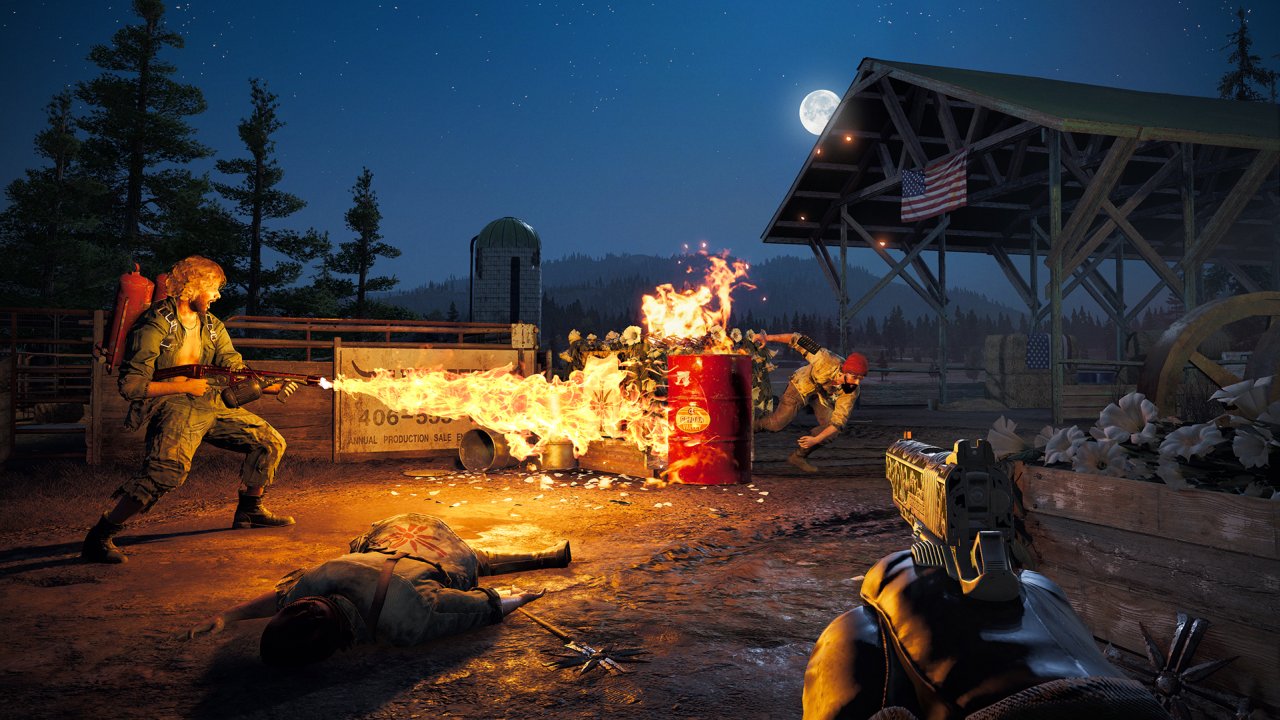
The abovementioned Resistance Meter is similar to Ghost Recon Wildlands. Each region’s boss can only be taken on after you’ve performed enough tasks to destabilize Eden’s Gate. These tasks include story missions, optional missions, destroying structures, attacking convoys, freeing prisoners, and of course clearing outposts. Each task adds to the meter, and you’ll need to perform quite a few actions before being allowed to fight the boss and free the region. Afterwards, you can still complete the rest of the missions/objectives. The game also toys around with the idea of enterable buildings, but this design often causes more confusion than anything. It isn’t immediately clear (especially in a firefight) which buildings can provide refuge, so running around looking for an interactable door or open window is more trouble than it’s worth. The scope of the game world is just right, though – it’s not too big and not too small, and provides ample opportunity for discovery without walking for extended periods in the wilderness. You’re never too far from a point of interest, and most of them become free fast travel points.
As such, using vehicles is almost never necessary, though the game does offer the mechanic of purchasing a few of them to be available at garages across the county. You can buy boats, ATVs, cars, helicopters, and airplanes, and put some custom paint on, but chances are there are some you can just “borrow” on your way to an objective. Vehicle handling is just okay, with helicopters and airplanes performing decently enough (except for dogfights, which can be rather frustrating), and the land and water vehicles severely lacking grip but still prove manageable.
The other main vendor is for weapons, and there is a standard selection of SMGs, assault rifles, shotguns, sniper rifles, rocket launchers, and so on. Once you’ve picked up and used a weapon in the field, it becomes available to permanently purchase. You can then customize the gun with basic attachments and some skins. You can then choose your loadout for free at the vendor. The guns are all quite satisfying to use, and you can buy scopes, silencer and extended magazine to add versatility. Shootouts can be quite fun, and that’s a good thing because you’ll be engaged often, even for missions where stealth is a viable approach.
The stealth has always been a key factor in Far Cry, with the series providing an arguably more satisfying feeling of clearing out camps without making a sound. Doing this in Far Cry 5 is viable, and does pay more, but the inconsistent AI makes it less enjoyable. You can mark enemies with binoculars (or companion dog Boomer), and disable alarms to avoid reinforcements. But even when using silenced weapons, if an enemy sees someone get taken out, the entire camp converges on your location, somehow knowing that’s where the shot came from. If you happen to be on a hill that’s out of reach, they then wander back to their posts just a few moments later. Yes you can painstakingly perform melee takedowns on everyone, and that’s the most surefire way not to raise suspicion. There is no minimap, just a UI indicator of enemy awareness; sometimes they will spot you from far, and sometimes won’t see you point blank.
So, as you’ll often end up in firefights, it’s a good thing that the guns are fun to use and you automatically pick up ammo, because there is a slight hitch with the controls scheme. Specifically, the game uses one button to perform a reload, to pick up any gun on the ground, to interact with an item/vehicle, and to loot fallen enemies. As you might imagine this gets a bit messy, especially in the heat of battle. You could be trying to activate a switch, but if there’s a dead body under it, you’ll loot it instead. If there’s a nearby weapon on the ground, you’ll pick that up and drop your awesome custom gun. The only way this design is useful is if you’re out of ammo and need to quickly swap weapons to something on the ground; all other times, this control scheme awkwardly gets in the way.
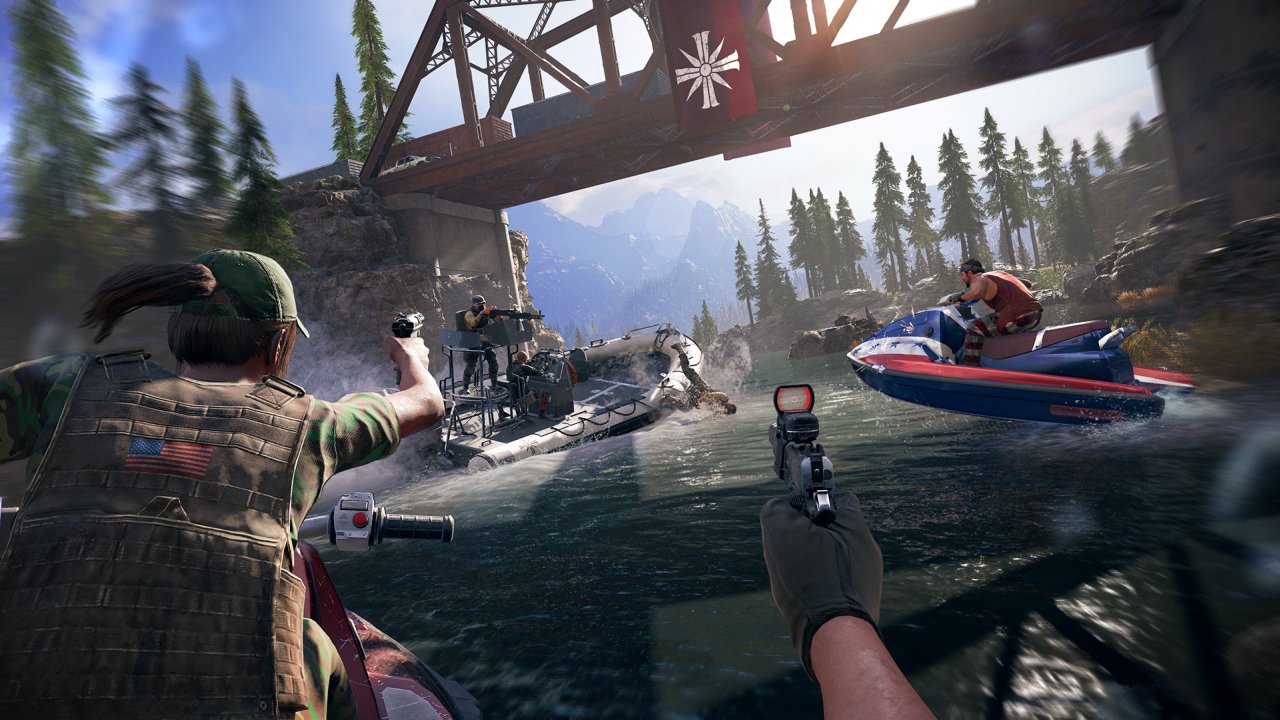
Unlike previous XP-based progression systems, Far Cry 5 utilizes a perks system that is unlocked by performing specific Challenge activities and finding items. Earning perk points involves playing in a variety of ways – getting certain number of kills with each type of weapon, with gadgets and melee, from your AI companions, hunting wildlife, and so forth. As such you’re not tied to story progress for unlocking new abilities and survival skills, and instead the game encourages you to try and play with as much variety as possible to earn the most perk points. The perks themselves are typical passive boosts – providing you more health, expanded storage, better weapon handling and stealth abilities, and so forth. You also unlock the wingsuit, parachute, and grappling hook for more tactical approaches to certain situations.
Aside from the missions, there are a few different side activities that are optional. You don’t need to climb towers, as the map is revealed via exploration, and you can also talk to marked resistance members to reveal new points of interest. You can go fishing, with a basic mechanic to reel in the catch without breaking the line. You can find wingsuit jump locations, or take on some stunt racing with Clutch Nixon quests. You can also come across environmental puzzles to gain access to resource stashes. There is much less focus on wildlife and crafting, though you can still hunt a few larger animals for their skins, to sell for profit. Crafting takes the form of throwable explosives such as Molotov’s and TNT, and homeopathics that give you a special boost, such as strength, speed, and heightened awareness. You can even craft special types of ammo. But, on default difficulty, Far Cry 5 is relatively easy, especially when you unlock special Guns for Hire that have great abilities. During the entire playthrough, it’s entirely possible you won’t even craft a single item because you can just restock items at gun shops, and pick up explosives as you explore enemy outposts, or use any homeopathics.
If there’s one thing Ubisoft developers are really good at, no matter the franchise, it is world building. And Far Cry 5’s virtual recreation of Montana is no exception. From the rivers in the valleys to the small lakes and nearby mountain peaks, it’s a wonderful and immersive world. The attention to detail is as high as ever, and the day/night cycle helps add to the atmosphere. It’s a good looking game, though not without occasional texture and shadow issues. Some audio queues and gameplay scripts don’t fire off properly, or too often and repeat themselves, making for a confusing few moments. The soundtrack and voice acting are solid and very location-appropriate.
For all the elements that the game borrows from Wildlands, it also unfortunately siphoned off some of the bugs as well. Although not quite on the same level, Far Cry 5 is nonetheless a less polished experience than we’ve come to expect from this particular franchise. Across 30 hours of play, we encountered numerous bugs and oddities, and though thankfully none of them were game breaking, they were quite notable. As previously mentioned, the AI behavior and skill can fluctuate wildly, and while that’s manageable for enemies, when your Guns for Hire begin acting irrationally, it becomes a problem. For example, the air support characters either crash or decide to jump out of their vehicles for no reason, plummeting to their death – which by the way puts them on a 20 minute timer before you can use them again. Allies also often get stuck and unable to resurrect you. Enemies and allies yell out constantly for unknown reasons, there’s always random gunfire everywhere across the game world. People and vehicles sometimes fly high into the air when they collide or otherwise glitch out. When you die in a vehicle, your restart location varies wildly – sometimes you’re near the start of the mission, sometimes you’re near where you died, and your car/helicopter could be next to you so you can continue, or back in base.
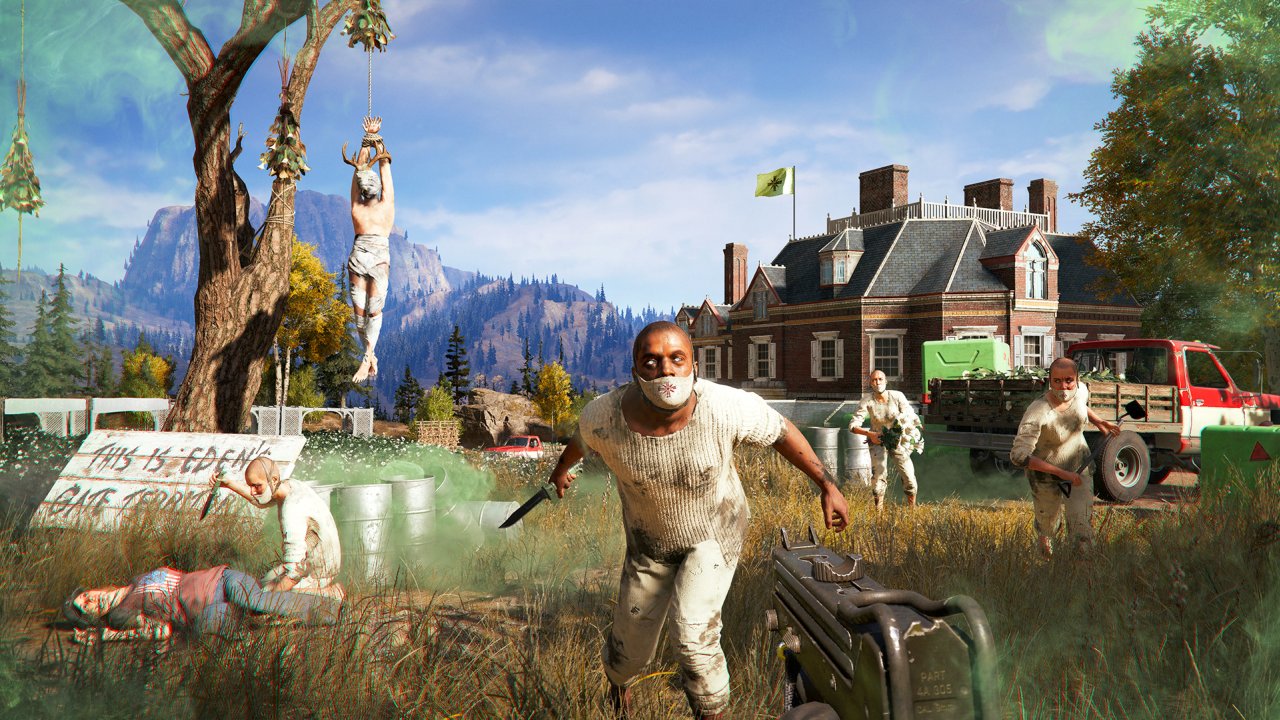
Similarly, during more scripted missions, enemy spawns are incredibly inconsistent, with foes suddenly appearing from out of nowhere. This becomes more apparent and annoying during the game’s villain sequences, which are by the way quite shallow and literally repeat themselves. Out in the open world, the game often spawns your objective targets way too late, as you literally watch them materialize out of the air and begin moving. And lastly – fans will recall the annoying eagle attacks from Far Cry 3 and 4; Far Cry 5’s version of this are attack planes, that begin patrolling once you’ve reached the last third of a Resistance Meter of a region. They are constantly around, triggering an alarm state, strafing you with guns, and making it frustrating to maintain stealth or use air transport.
You don’t have to fight as the lone human player in Far Cry 5. Similar with previous game, you can use the Friend for Hire system for drop-in/drop-out cooperative play with a friend. This time around, the entire game and almost all missions can be played together. The downside here is that, of all the ideas that the game borrows from Wildlands, it does not allow the guest player to keep their game world progress. If you join someone else’s game, you will keep your earned money, perks, and items, but any quests you complete will not count towards your own world’s progress and Resistance meter. It seems like a bit of a step back, and puts more incentive on being the host. Another step back is that, unlike FC4, there is no matchmaking for co-op, which seems like another needlessly removed option.
If you’re short on friends but still want to play cooperatively, the expanded Guns for Hire system returns. You can now walk up to almost any resistance fighter and hire them, and they will follow commands. The fighters fall into a few categories, and after getting them enough combat experience they can unlock two unique perks. Critically, they can also revive you in battle so you don’t have to restart from a checkpoint. The friendly AI is OK and keeps itself busy and alive during the action. There are also special characters you can hire that tie into the story, such as Jess Black, Nick Rye, or the bear named Cheeseburger. These characters have a unique and helpful set of abilities and are often more useful than the generic hires. For example Nick Rye flies around and provides air support, while the dog Boomer sniffs out nearby foes so you don’t have to use your binoculars to tag enemies before moving in.
For those in the mood for more action outside of the established game world, there’s an additional mode called Far Cry Arcade. Here, players can download, play, and rate a variety of user-created levels. These custom solo/co-op scenarios use the assets from the main game, as well as other Ubisoft franchises, and offer a wealth of custom modifiers to create unique experiences. There are four activity types – journey, bounty hunt, assault, and outpost. Assault eggs you on to take out a bunch of foes in an area; bounty hunt tasks you with eliminating a specific target and escaping. Outpost is the typical infiltration experience just as you’d find in the main game, and finally journey is meant to create unique and non-combat focused scenarios.
You can browse and download Arcade maps manually, and playing them unlocks some cash and perk points based on your profile level. The cash and perk points earned in Arcade carry over to the main game, and vice versa. If you feel adventurous, there’s an Arcade Hero mode which picks and downloads custom scenarios for you, which can lead to discovering some truly unique (or truly awful) levels, but for your effort to explore the lesser known community creations you get more rewards. Lastly, there’s the traditional deathmatch and team deathmatch competitive modes with matchmaking for up to 12 players and 2 teams of six, respectively. Players have a pre-set choice of loadouts depending on the map, and the action flows fairly steadily – since there are no helmets, headshots feel quite powerful. The connectivity is good, and the only issues come from the fact that players are difficult to tell apart because the names of friends/foes only appear when you’re a certain distance away. Players do have outlines, but they are very minor.
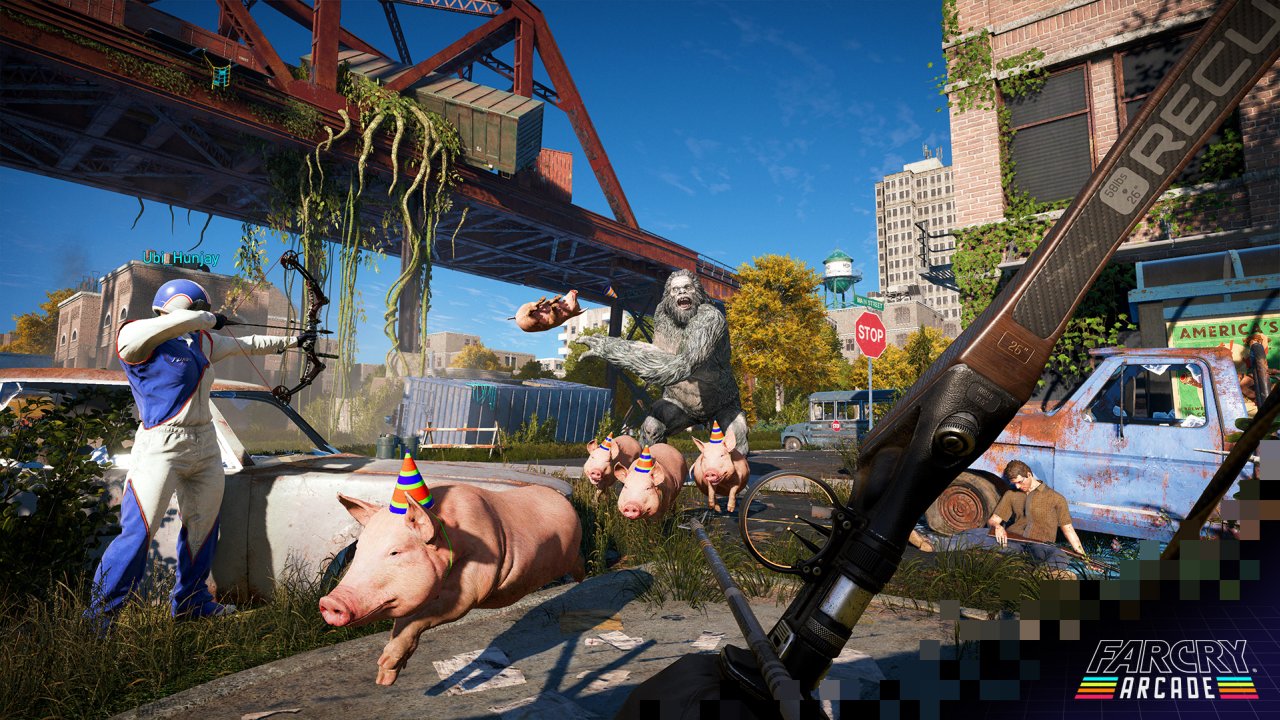
All of the content in Arcade co-op and multiplayer comes from the Arcade Editor tool. The editor is fairly powerful and easy to use, and even contains items from other Ubisoft games such as Watch Dogs and Assassin’s Creed, so you can place skyscrapers in the middle of a forest. It suffers from quite notable FPS drops, but thankfully these don’t translate into the map when you actually play it. While this approach is fine for co-op and solo missions, having player-made maps in competitive multiplayer is a problem. Like most games that rely entirely on user-generated content, most of the maps are very poorly made and sport appropriately low user ratings. Unfortunately, that’s all you get – Ubisoft only included a couple of dev-made maps, so for most of the time you’ll be suffering through terrible levels that make competitive games nearly impossible to enjoy.
Far Cry 5 continues the trend of combining and expanding on mechanics that were originally developed in other Ubisoft franchises, but with underwhelming results. The mishmash of Ghost Recon Wildlands with Far Cry does not result in a successful concoction. The publisher has their open world gameplay down to a formula, and that’s okay, but when the same framework gets applied to the story it becomes lifeless, a collection of cutscenes that trigger at specific intervals with little context; it loses all sense of pacing, surprises and tension along the way. The various gameplay mechanics all work well enough together and the action is satisfying, though it suffers from poor AI that’s particularly notable when utilizing stealth. A very detailed open world is at least once again immersive. Far Cry Arcade is a neat addition for fans of user-generated content and wanting to distill the game to its purest components in small doses, but competitive multiplayer modes suffer from lack of quality as there are almost no developer-made maps. In the end, Far Cry 5 is a solid enough action game with a great setting, but let down by some of the design decisions and occasional lack of polish.
